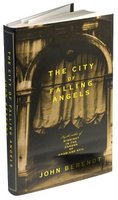
Following up his megahit, Midnight in the Garden of Good and Evil, John Berendt has found another oppulent city populated by the bizarre, the brazen, and the bored. A second true life crime story, The City of Falling Angels begins with the 1996 fire that gutted La Fenice, the eighteenth century Venetian opera house that premiered some of opera's greatest works including Igor Stravinsky's The Rake's Progress.
Berendt moved to Venice just after the fire, investigating what the locals thought happened, following the case in the courts, and learning about the real Venice along the way. The star of Falling Angels, though narrated in the first person, is not the author but rather the city of Venice itself—the ancient city of Carnival with its requisite canals and palazzos with their piano nobile. According to Berendt, it is not the uniqueness of its architecture or even beauty of Murano glass but of its people that reveals the real Venice.
The City of Falling Angels is obstinsibly about the fire at La Fenice, and though that thread runs through the book offering a modicum of cohesiveness, it is really just a book about the inhabitants of Venice. But what a colorful book it makes. Characters like the Plant Man, who every day tries to hock his greenery to the locals while singing, "Have you got a house?" or the Rat Man, whose concocts rat poison from parmesan cheese (for Italian rats) or weiner schnizel (for German rats), are just the beginning. Revealing the strange twists and turns in the life stories of important expatriates like Ezra Pound and Peggy Guggenheim, Berendt's magic is passing on gossip like it's fact. One of the most entertaining episodes is that of Save Venice, an NGO working to restore the magnificence of Venice while suffering a major meltdown among the many type personalities on its Board of Directors.
Somehow, everyone (or everyone but Jane and Philip Rylands) was willing to speak to John Berendt, revealing secrets they would never speak publicly. Beware though, according to Count Girolamo Marcello, "Venetians never tell the truth. We mean precisely the opposite of what we mean."
When I finished reading Midnight in the Garden of Good and Evil, I wanted to visit Savannah as soon as possible. It took a couple of years, but finally I did it. "The book" as Midnight is known there, was everywhere. The City of Falling Angels has had the same effect. I can't wait to go. Maybe I'll bring back a plant!
Berendt moved to Venice just after the fire, investigating what the locals thought happened, following the case in the courts, and learning about the real Venice along the way. The star of Falling Angels, though narrated in the first person, is not the author but rather the city of Venice itself—the ancient city of Carnival with its requisite canals and palazzos with their piano nobile. According to Berendt, it is not the uniqueness of its architecture or even beauty of Murano glass but of its people that reveals the real Venice.
The City of Falling Angels is obstinsibly about the fire at La Fenice, and though that thread runs through the book offering a modicum of cohesiveness, it is really just a book about the inhabitants of Venice. But what a colorful book it makes. Characters like the Plant Man, who every day tries to hock his greenery to the locals while singing, "Have you got a house?" or the Rat Man, whose concocts rat poison from parmesan cheese (for Italian rats) or weiner schnizel (for German rats), are just the beginning. Revealing the strange twists and turns in the life stories of important expatriates like Ezra Pound and Peggy Guggenheim, Berendt's magic is passing on gossip like it's fact. One of the most entertaining episodes is that of Save Venice, an NGO working to restore the magnificence of Venice while suffering a major meltdown among the many type personalities on its Board of Directors.
Somehow, everyone (or everyone but Jane and Philip Rylands) was willing to speak to John Berendt, revealing secrets they would never speak publicly. Beware though, according to Count Girolamo Marcello, "Venetians never tell the truth. We mean precisely the opposite of what we mean."
When I finished reading Midnight in the Garden of Good and Evil, I wanted to visit Savannah as soon as possible. It took a couple of years, but finally I did it. "The book" as Midnight is known there, was everywhere. The City of Falling Angels has had the same effect. I can't wait to go. Maybe I'll bring back a plant!
Comments